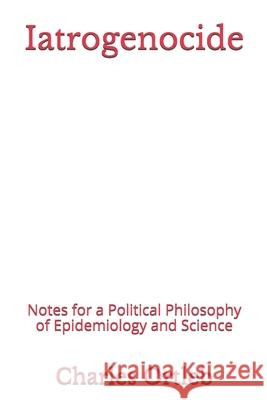Iatrogenocide: Notes for a Political Philosophy of Epidemiology and Science » książka
Iatrogenocide: Notes for a Political Philosophy of Epidemiology and Science
ISBN-13: 9781477471395 / Angielski / Miękka / 2017 / 238 str.
Iatrogenocide is a book bound to cause a shift in our understanding of epidemiology and science. In the tradition of Thomas Kuhn, Charles Ortleb has looked beneath the hood of science and exposed the cultural, social, and political inner workings of an intellectual endeavor that affects the lives of everyone.
His journey to his new political philosophy of epidemiology and science began in 1981 when he was the publisher and editor-in-chief of New York Native, a newspaper with a national gay readership in New York City. His newspaper wasn't even a year old when the first report appeared in the media about what would become known as the AIDS epidemic. He is widely credited with being the first publisher and editor-in-chief to take the epidemic seriously and to use a newspaper's resources to dig into the story.
New York Native's coverage of the epidemic was so thorough that, in Rolling Stone, David Black said it deserved a Pulitzer Prize. As the epidemic unfolded, Ortleb oversaw the work of a number of talented journalists and writers who helped turn New York Native into the paper of record (and conscience) for the AIDS epidemic as well as its intertwined epidemic of Chronic Fatigue Syndrome which was concealed by all kinds of political legerdemain.
The thoughts in this volume were culled from notebooks in which he began to work out his ideas for a political philosophy of epidemiology and science. He has concluded that what we think of as the epidemiology and science of AIDS and Chronic Fatigue Syndrome are essentially a corrupted hard drive. Because of sexual and racial bigotry, virtually all of the science and conducted on that hard drive is false even though it has the appearance of being rational, progressive, and normal. A bold new kind of political philosophy of epidemiology and science has helped him understand how that hard drive got corrupted in the first place. The thoughts in this book will help show a way forward for anyone who wants to fix that hard drive.
During his experience of watching the AIDS and Chronic Fatigue Syndrome disaster unfold, Ortleb realized that only a new political philosophy of epidemiology and science could awaken people to what has really happened. A biomedical crime against humanity was being committed, but even serious intellectuals like Susan Sontag and many others could not perceive what was occurring before their very eyes. They could only see the surface of what was happening because they did not fully understand the intense political nature of epidemiology and science. They trusted and they did not verify what the scientific establishment was telling them. Public health is now in a state of peril because the best and the brightest were asleep at the switch.
In addition to Thomas Kuhn, Ortleb's thinking has been heavily influenced by the work of Hannah Arendt, George Orwell, Isaiah Berlin, Sartre, and Camus. Like these thinkers and writers, his work is both analytical and creative. His background as a poet, journalist, humorist, and fiction writer has helped him craft one of the liveliest books of philosophical thoughts of our time.
Charles Ortleb is the author of numerous books including Truth to Power, the definitive history of the AIDS epidemic. His most recent works of fiction are Pig: A Memoir and The Stonewall Massacre.
Zawartość książki może nie spełniać oczekiwań – reklamacje nie obejmują treści, która mogła nie być redakcyjnie ani merytorycznie opracowana.











